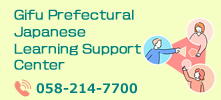◆Foreign Language Disaster Guides
GIC has produced Disaster Guides in foreign languages explaining what to do when a disaster occurs, precautions to take when evacuating, and disaster prevention measures, in order that foreigners may not be disproportionately affected in the event of a natural disaster.
The guide is pocket-sized and there is a space for you to write in your personal details and emergency contact information.
Please contact us if you would like a Disaster Guide, or download one from the link below.
・Japanese/English/Chinese Disaster Guide: ![]()
![]()
Disasters can happen at any time.
Even if an evacuation warning has not been issued, you may still be in danger. Please take responsibility for your own safety.
If you think you may be in danger, leave the area and seek shelter as soon as possible.
〇What is evacuation?
To evacuate is to move to a safe location if you sense danger in order to ensure your own safety.
〇What is an evacuation shelter?
If you are unable to return to your home because it has collapsed, you can stay at an evacuation shelter for free.
You can get food, water, and important information here.
〇How to evacuate
◆Walk to the evacuation shelter rather than travelling by car.
◆Take as little with you as possible.
(Residence (zairyu) card, passport, cash, bank passbook, mobile phone, radio, water, food, change of clothes, torch, phone charger (compatible with dry cell batteries), etc.)
◆You will not have access to electrical outlets at an evacuation shelter. Please bring a battery-operated charger.
〇What to do at an evacuation shelter
◆Please write your name and other relevant information at the registration desk. This is so other people know that you are there.
◆A lot of different people live together at an evacuation shelter. Please observe the rules.
![]()
![]()
Use this service to confirm the safety and whereabouts of your family and friends.
〇Mobile Phone "Disaster Message Board"
When a large scale disaster strikes (such as an earthquake of magnitude 6 or over), a link to the "Disaster Message Board" will be published promptly on the homepage of your mobile phone's internet browser.
① You can use your mobile phone to access the "Disaster Message Board" web service (available in English and Japanese) and leave a message.
②If your friends or family access the "Disaster Message Board" and enter in your mobile phone number, they can view the message you left.

Make sure to always obtain correct information from the radio, television or your local authority.
〇Internet
・NHK World (Multilingual Website)
https://www3.nhk.or.jp/nhkworld/
※Listen in 18 languages.
・Gifu Prefecture Disaster Prevention Internet Portal Site
https://www.pref.gifu.lg.jp/bousai/en/index.html
〇Twitter
・Japan Safe Travel
https://twitter.com/JapanSafeTravel
〇Safety Tips App
This free app, developed for foreign tourists by the Japan Tourism Agency, allows users to receive notifications when Earthquake Early Warnings, Tsunami Warnings, Volcanic Warnings, Weather Warnings, Heatstroke Warnings and Civil Protection Information are issued within Japan.
Languages: English, Chinese (simplified/traditional), Korean, Japanese
・Android : https://play.google.com/store/apps/details?id=jp.co.rcsc.safetyTips.android
・iPhone:https://itunes.apple.com/jp/app/safety-tips/id858357174?mt=8
〇Radio
・Gifu Chan AM: 1431kHz
・FM Gifu: 80.0MHz
・NHK AM1: 729kHz
・NHK AM2: 909kHz / FM:83.6MHz
・CBC AM: 1053kHz
・Tokai AM: 1332kHz














